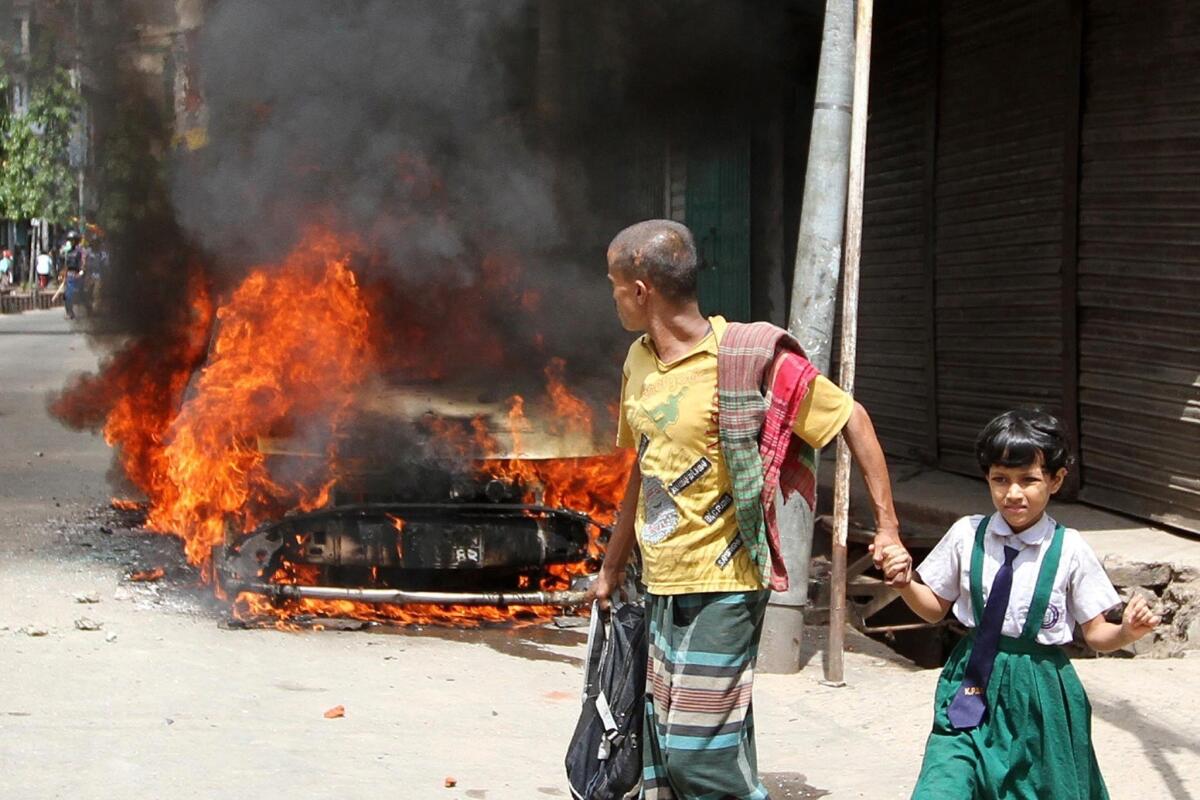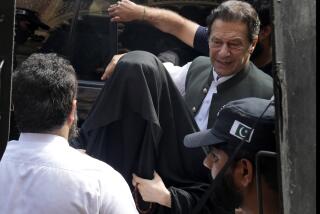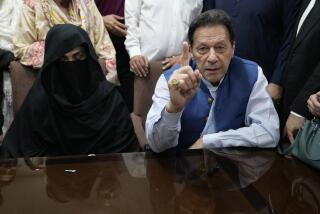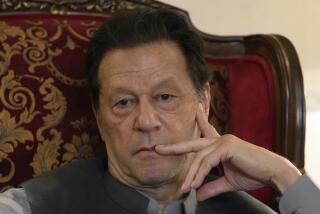In Bangladesh, death penalty for Islamist leader sparks riots

NEW DELHI -- The Bangladesh Supreme Court on Tuesday handed down the death penalty to an opposition leader with the country’s main Islamist party, who was convicted of committing mass murder during the 1971 war of independence with Pakistan.
As word of the verdict against Abdul Quader Molla of Jamaat-e-Islami spread, Islamist protesters in the capital of Dhaka and in the port city of Chittagong marched, exploded homemade bombs, torched vehicles and threw stones at police.
A few hours later, a Jamaat statement called a two-day nationwide strike starting Wednesday, decrying the “government conspiracy to kill our leaders.”
Tuesday’s decision goes beyond the lifetime-imprisonment punishment handed down against Quader Molla by a Bangladesh war crimes tribunal in February.
“We are stunned by the verdict,” defense lawyer Tajul Islam told reporters, adding that defense attorneys may petition for a review of the sentence after they have read the judgment. “This is the first time in South Asian judicial history that a trial court sentence has been enhanced by a supreme court.”
The February verdict sparked violent protests, both by Islamist supporters who accused the government of using the courts to mount a political witch hunt, and secularists who massed in the tens of thousands at a Dhaka square, calling the prison sentence too lenient.
Over 100 people have died in war-crime-related demonstrations so far this year. Given Bangladesh’s deeply polarized society and the passions associated with this case, analysts said they’re bracing for more violence in the near future.
Jamaat is an important component in the opposition coalition, and the government reportedly tried to sway the party over to its side. After talks reportedly broke down, Bangladesh’s high court ruled in August that Jamaat-e-Islami was registered illegally, effectively preventing the party from competing in the general election expected in January.
Quader Molla, 65, who is Jamaat’s assistant secretary-general and the fourth most senior leader in the party, is accused of ordering the execution of a college student, killing a poet and his family and leading a gang of men on a killing rampage in the Mirpur area of Dhaka, earning him the nickname the “Butcher of Mirpur.”
After the February public outcry, Parliament changed the war-crimes statutes, paving the way for the prosecution to appeal the verdict and seek Tuesday’s tougher death penalty outcome. Previously, prosecutors could appeal only in the event of an acquittal while the defense could appeal any outcome.
Since January, two war-crimes tribunals have delivered verdicts in cases against several former and current Jamaat leaders. This is the first to run its course through the Supreme Court.
Analysts noted the unusual practice of applying an amended law to a case after the original trial has been held. “Since the verdict was given, then the law changed, it raises some questions among jurists,” said Salahuddin Aminuzzaman, a professor of public administration at Dhaka University. “It seems to be a verdict that favors those calling for tougher punishment.”
Others, however, welcomed the outcome. “What Quader Molla did, it’s a crime, it’s criminal,” said Kamal Hossain, a lawyer and political analyst. “It’s a good decision. Jamaat people will say it’s not a good outcome, but common people believe it is.”
Quader Molla -- who also appealed the February guilty verdict on murder, rape and torture charges, hoping they’d be dropped -- has denied all charges against him. The death sentence was handed down Tuesday by a four-to-one majority on the five-judge bench.
Official estimates place the number of deaths in the 1971 war at 3 million, although some independent analysts put the figure lower.
Bangladesh’s controversial International Crimes Tribunal, which has been criticized by human rights groups, is not sanctioned by the U.N. It was set up in 2010 by the current government to try those accused of collaborating in 1971 with Pakistan to stop Bangladesh, then known as East Pakistan, from gaining independence.
ALSO:
Colombia to pay Ecuador $15 million to settle coca herbicide suit
Israeli court invalidates law that allows asylum seekers to be jailed
South Korean troops shoot, kill man trying to cross to North Korea
More to Read
Start your day right
Sign up for Essential California for news, features and recommendations from the L.A. Times and beyond in your inbox six days a week.
You may occasionally receive promotional content from the Los Angeles Times.






